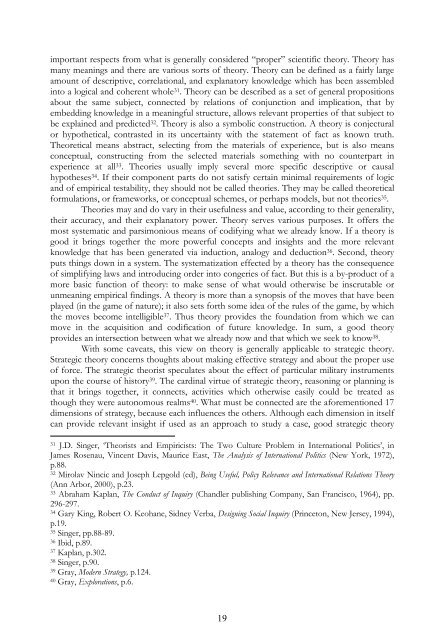Science, Strategy and War The Strategic Theory of ... - Boekje Pienter
Science, Strategy and War The Strategic Theory of ... - Boekje Pienter
Science, Strategy and War The Strategic Theory of ... - Boekje Pienter
You also want an ePaper? Increase the reach of your titles
YUMPU automatically turns print PDFs into web optimized ePapers that Google loves.
important respects from what is generally considered “proper” scientific theory. <strong>The</strong>ory hasmany meanings <strong>and</strong> there are various sorts <strong>of</strong> theory. <strong>The</strong>ory can be defined as a fairly largeamount <strong>of</strong> descriptive, correlational, <strong>and</strong> explanatory knowledge which has been assembledinto a logical <strong>and</strong> coherent whole 31 . <strong>The</strong>ory can be described as a set <strong>of</strong> general propositionsabout the same subject, connected by relations <strong>of</strong> conjunction <strong>and</strong> implication, that byembedding knowledge in a meaningful structure, allows relevant properties <strong>of</strong> that subject tobe explained <strong>and</strong> predicted 32 . <strong>The</strong>ory is also a symbolic construction. A theory is conjecturalor hypothetical, contrasted in its uncertainty with the statement <strong>of</strong> fact as known truth.<strong>The</strong>oretical means abstract, selecting from the materials <strong>of</strong> experience, but is also meansconceptual, constructing from the selected materials something with no counterpart inexperience at all 33 . <strong>The</strong>ories usually imply several more specific descriptive or causalhypotheses 34 . If their component parts do not satisfy certain minimal requirements <strong>of</strong> logic<strong>and</strong> <strong>of</strong> empirical testability, they should not be called theories. <strong>The</strong>y may be called theoreticalformulations, or frameworks, or conceptual schemes, or perhaps models, but not theories 35 .<strong>The</strong>ories may <strong>and</strong> do vary in their usefulness <strong>and</strong> value, according to their generality,their accuracy, <strong>and</strong> their explanatory power. <strong>The</strong>ory serves various purposes. It <strong>of</strong>fers themost systematic <strong>and</strong> parsimonious means <strong>of</strong> codifying what we already know. If a theory isgood it brings together the more powerful concepts <strong>and</strong> insights <strong>and</strong> the more relevantknowledge that has been generated via induction, analogy <strong>and</strong> deduction 36 . Second, theoryputs things down in a system. <strong>The</strong> systematization effected by a theory has the consequence<strong>of</strong> simplifying laws <strong>and</strong> introducing order into congeries <strong>of</strong> fact. But this is a by-product <strong>of</strong> amore basic function <strong>of</strong> theory: to make sense <strong>of</strong> what would otherwise be inscrutable orunmeaning empirical findings. A theory is more than a synopsis <strong>of</strong> the moves that have beenplayed (in the game <strong>of</strong> nature); it also sets forth some idea <strong>of</strong> the rules <strong>of</strong> the game, by whichthe moves become intelligible 37 . Thus theory provides the foundation from which we canmove in the acquisition <strong>and</strong> codification <strong>of</strong> future knowledge. In sum, a good theoryprovides an intersection between what we already now <strong>and</strong> that which we seek to know 38 .With some caveats, this view on theory is generally applicable to strategic theory.<strong>Strategic</strong> theory concerns thoughts about making effective strategy <strong>and</strong> about the proper use<strong>of</strong> force. <strong>The</strong> strategic theorist speculates about the effect <strong>of</strong> particular military instrumentsupon the course <strong>of</strong> history 39 . <strong>The</strong> cardinal virtue <strong>of</strong> strategic theory, reasoning or planning isthat it brings together, it connects, activities which otherwise easily could be treated asthough they were autonomous realms 40 . What must be connected are the aforementioned 17dimensions <strong>of</strong> strategy, because each influences the others. Although each dimension in itselfcan provide relevant insight if used as an approach to study a case, good strategic theory31 J.D. Singer, ‘<strong>The</strong>orists <strong>and</strong> Empiricists: <strong>The</strong> Two Culture Problem in International Politics’, inJames Rosenau, Vincent Davis, Maurice East, <strong>The</strong> Analysis <strong>of</strong> International Politics (New York, 1972),p.88.32 Mirolav Nincic <strong>and</strong> Joseph Lepgold (ed), Being Useful, Policy Relevance <strong>and</strong> International Relations <strong>The</strong>ory(Ann Arbor, 2000), p.23.33 Abraham Kaplan, <strong>The</strong> Conduct <strong>of</strong> Inquiry (Ch<strong>and</strong>ler publishing Company, San Francisco, 1964), pp.296-297.34 Gary King, Robert O. Keohane, Sidney Verba, Designing Social Inquiry (Princeton, New Jersey, 1994),p.19.35 Singer, pp.88-89.36 Ibid, p.89.37 Kaplan, p.302.38 Singer, p.90.39 Gray, Modern <strong>Strategy</strong>, p.124.40 Gray, Explorations, p.6.19
















